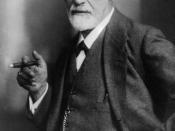Like many writers of his time, Hawthorne emphasized man's inner reality, and those thoughts and feelings which are not immediately apparent. As he explored this internal nature, he not only found the source of dignity and virtue, but also certain elements of darkness and violence. In The Minister's Black Veil, these elements are treated as real and inescapable forces in human existence. The unifying theme is the conflict between the dark, hidden side of man and the standards imposed by his puritanical heritage, and the psychological and practical implications of this conflict. Hawthorne brings evil and unauthorized desire into the circuit of puritan life, and thereby conveys a profound truth that is disturbing in its implication, namely that we can never hope to know each other's true selves. The themes in the story are suggested by the veil-symbol, the tension between the minister and the community, and the use of pro-Freudian psychological analysis.
The symbolic significance of the black veil lies in the physical and mental barrier that it creates between the minister and his environment, and the guilt that it expresses. Many people believe that the face provides information about a person's underlying characteristics and, therefore, about his or her probable behavior. Thus, by wearing the veil, the minister takes away the basis on which people can predict his behavior. This is the main cause of the minister's isolation, although he is made unpredictable already by the mere act of wearing the veil. Part of the frightening effect of the veil derives from the knowledge that the person behind it can see everything without being seen himself:
'Each member of the congregation, the most innocent girl, and the man of hardened breast, felt as if the preacher had crept upon them, behind this awful veil, and discovered...



The Minister's Black Veil
good essay about the Minister's Black Veil but without references
0 out of 0 people found this comment useful.